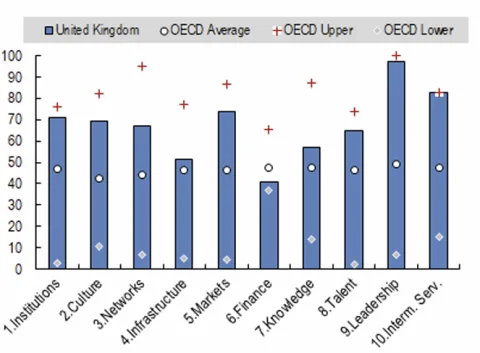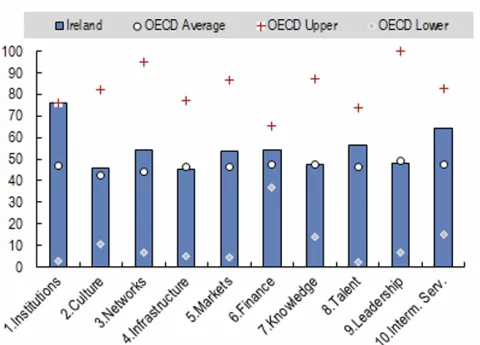
Inside the UK & Ireland’s Entrepreneurial Ecosystems
In June 2025, the Organisation for Economic Co-operation and Development (OECD) released a powerful new diagnostic tool to assess how well national ecosystems support entrepreneurship across ten key dimensions.
The OECD is an international organisation that works with governments, policy makers and stakeholders to build better policies for better lives. Drawing on over 60 years of data and policy expertise, the OECD helps shape evidence-based solutions to today’s most pressing challenges — including those that drive innovation, entrepreneurship, and inclusive economic growth. Its 38 member countries span the globe, from North and South America to Europe and the Asia-Pacific region, offering a diverse benchmark for ecosystem performance.
What Does the Diagnostic Measure?
The Entrepreneurial Ecosystem Diagnostic evaluates country-level conditions that influence the creation and growth of start-ups and scale-ups — from finance and infrastructure to leadership, culture, and collaboration. It focuses on the wider enabling environment, using national-level indicators rather than firm-specific or sector-specific data.
The framework is structured around 10 interconnected elements:
- Institutions – regulatory, administrative, and tax environments
- Culture – public perceptions and social attitudes toward entrepreneurship
- Networks – collaboration between firms, universities, and support actors
- Infrastructure – physical and digital connectivity for business
- Markets – access to demand and competition
- Finance – availability of capital, credit, and investment
- Knowledge – research capacity and innovation potential
- Talent – entrepreneurial and technical skills in the workforce
- Leadership – vision-setting actors, including serial entrepreneurs
- Intermediate Services – access to business services like mentoring, legal advice, and accelerators
How Are the UK and Ireland Performing?
For those of us working across the UK and Ireland, the findings offer timely insight into how both countries are supporting entrepreneurial activity. While each shows real strengths, the analysis also surfaces critical gaps — and opportunities to design stronger, more coherent ecosystem strategies. A summary of the UK and Ireland’s performance across the ten dimensions is provided below.
United Kingdom
Strengths and Highlights
- Top performer in Intermediate Services — legal, mentoring, and technical support are abundant.
- Leadership is a standout, reflecting a strong base of serial entrepreneurs.
- Talent and Culture also score highly, showcasing a strong pool of skilled professionals and a supportive mindset for entrepreneurship.
- Institutions are a UK strength — alongside Ireland and the Scandinavian countries, the UK offers one of the most conducive regulatory and administrative environments for productive entrepreneurship.
- Markets access ranks 4th overall — a sign of healthy demand and competition.
- Women founders make up 25%+ of start-up founders — one of the highest shares across OECD countries.
Areas for Improvement and Growth
- Access to Finance ranks 19th out of 27 — below the OECD average — signalling a need for stronger investment-readiness support, angel networks, public sector VC, and improved access to grants and loans. While the UK leads on Intermediate Services and ranks well for accelerator density, this highlights the need for more entrepreneurial capability-building interventions, particularly around fundraising preparation, financial literacy, and scaling strategy.
- Within the Infrastructure element, the UK experienced a notable decline in the overall quality of transport infrastructure between 2016 and 2023.
- In Networks, the UK ranks 2nd overall and 2nd on SME collaboration, but lags behind many peers when it comes to collaboration between firms and universities on R&D.

UK data: OECD Entrepreneurial Ecosystem Diagnostics, 2025
Ireland
Strengths and Highlights
- Ranks 1st in Institutions, reflecting the most supportive regulatory and administrative environment for productive entrepreneurship.
- Punches above its weight: top-tier unicorn output relative to size.
- High startup survival rates — second only to Sweden
- Strong in Intermediate Services, thanks to robust incubator and tech support networks
- Access to Finance is significantly better than the UK — ranked 7th.
- Ireland ranks 4th for the share of women founders among startups.
Areas for Improvement and Growth:
- Culture is a less strong element, but is improving with rising perceptions of entrepreneurship as a good career choice.
- Knowledge is mixed: Ireland outperforms the UK on patents per capita, but ranks very low on R&D expenditure as a share of GDP.
Infrastructure and Leadership could benefit from targeted support such as broadband investment, digital innovation hubs, entrepreneurship alumni networks, and stronger private-sector input in policymaking.
![Ireland Entrepreneurial Ecosystem Diagnostic]()
Ireland data: OECD Entrepreneurial Ecosystem Diagnostics, 2025
What This Means for Ecosystem Leaders
The OECD’s diagnostic reinforces a growing consensus: that entrepreneurship can’t be supported through isolated interventions alone. Effective ecosystems require coherent, connected policies that reflect the complex, interdependent nature of entrepreneurial growth.
One critical takeaway is the need to connect capital access with capability building, particularly in ecosystems like the UK, where strong support infrastructure can mask deeper readiness challenges. Strengthening finance pathways isn’t enough: founders must also be equipped to confidently navigate them.
From our work with over 330 research and technology-based founders, we’ve seen this challenge play out first-hand. Many teams report that without early sales traction, it's difficult to build a compelling commercial case for investors — a dynamic that often creates a catch-22, stalling progress on both sales and fundraising. Addressing this requires not just access to funding, but targeted support that builds investor readiness and commercial confidence in parallel.
These dynamics underline the importance of designing interventions that don’t just target single barriers but recognise how entrepreneurial success is shaped by multiple, overlapping conditions. This is a perspective we carry into our own work, where our entrepreneurial education programmes focus on three critical drivers of growth: access to capital (cash), customers (markets), and connections (networks). These are not just founder needs; they are ecosystem levers, and addressing them in tandem is what turns support into real, sustainable progress.
For a deeper dive into the methodology and full report findings, the complete Entrepreneurial Ecosystem Diagnostics Report is available on the OECD website.
Discover how our founder programmes support entrepreneurial progress



